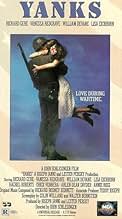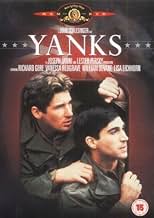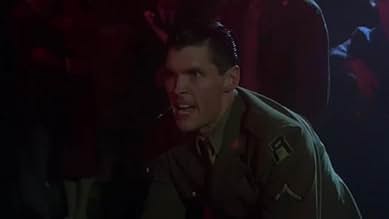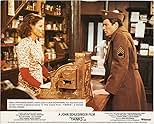IMDb-BEWERTUNG
6,4/10
3879
IHRE BEWERTUNG
Füge eine Handlung in deiner Sprache hinzuJoining WWII, USA ships soldiers to UK. Matt and John arrive in 1942. Each see a local woman - married or to be engaged with soldiers serving faraway.Joining WWII, USA ships soldiers to UK. Matt and John arrive in 1942. Each see a local woman - married or to be engaged with soldiers serving faraway.Joining WWII, USA ships soldiers to UK. Matt and John arrive in 1942. Each see a local woman - married or to be engaged with soldiers serving faraway.
- 2 BAFTA Awards gewonnen
- 6 Gewinne & 7 Nominierungen insgesamt
Philip Wileman
- Billy Rathbone
- (as Philip Whileman)
Andy Lucas
- The Americans - Cook
- (as Andy Pantelidou)
Empfohlene Bewertungen
John Schlesinger returns to the land of his early, wonderful "A Kind Of Loving" and "Billy Liar" for a cross-cultural love story with a critical but undoubtedly affectionate eye. Richard Gere, pre-"American Gigolo" is terrific as Matt, the cook who falls for Jean, the local English rose played beautifully by the splendid American actress, Lisa Eichhorn. The Americans posted in the North of England felt truly abroad, they could hardly understand the lingo. For the locals it was a different story, they understood the American GI's because after all, they spoke like Gary Cooper. The elders look at the abrasive newcomers with politeness but also with a tinge of suspicion. There was a catch phrase at the time to describe the American troops: "They're overpaid, oversexed and over here" The cultural differences go beyond language and in a masterful writing stroke tells us why. Richard Gere tells Lisa Eichhorn about his dreams for the future - building a chain of Motels across America - while her British boyfriend dreams of getting married and building their home above his parents shop. Lisa Eichhorn's Jane is the perfect "man in the middle" attached to her parents (the wonderful Rachel Roberts and Tony Melody)world, and at the same time, she is fascinated by Richard Gere's look at the American dream - the "everything is possible" mentality. The film is a gem. Unfairly overlooked in its day but now on its 30th anniversary risks to be rediscovered and and re-evaluated. It certainly deserves another life.
This movie presented the American actress Lisa Eichhorn to the world - and if for only that, we can be so terribly grateful to John Schlesinger. (I'm grateful to him for other reasons too: for Darling, for A Kind of Loving, for Far From the Madding Crowd, for Midnight Cowboy and many others).
Eichhorn's beauty, sensitivity, intelligence, warmth, reserve mixed with eager longing, her very movement, beguile and entrance. She is truly remarkable - and this performance (as well as those in The Europeans, King of the Hill and Cutter's Way) deserved an Oscar. I would certainly place her with Meryl Streep, Glen Close, Jessica Lange, Ellen Burstyn, Anne Bancroft, Blair Brown and Sissy Spacek in the top echelon of American actresses.
There seem to be worlds of emotion, of thought, of native refinement and wild longing within this girl as she struggles with her conscience, with her family, about her English fiance, and with her insecurity about her American romance. There is nothing in entertainment I would like as much as to see more of Lisa Eichhorn (wonderful in everything from screen to stage to television) - she's very special.
I think this movie one of the most romantic ever made - not the muted Devane-Redgrave romance - nor the unfortunately clicheed working class pair - but the most highlighted involving Gere and Eichhorn. It sweeps one completely off one's feet.
Apart from the romance, the movie is quite good in showing both Britain at home (some of the feeling of Hope and Glory) and in interaction with the Americans. It could just be me, but aren't the Americans exaggerating their accents slightly to show the difference? Perhaps Gere and Devane just sound more American in contrast.
This is a lovely memorable movie - well shot, wonderfully acted, with an ending that leaves one in tears. Do see it.
Eichhorn's beauty, sensitivity, intelligence, warmth, reserve mixed with eager longing, her very movement, beguile and entrance. She is truly remarkable - and this performance (as well as those in The Europeans, King of the Hill and Cutter's Way) deserved an Oscar. I would certainly place her with Meryl Streep, Glen Close, Jessica Lange, Ellen Burstyn, Anne Bancroft, Blair Brown and Sissy Spacek in the top echelon of American actresses.
There seem to be worlds of emotion, of thought, of native refinement and wild longing within this girl as she struggles with her conscience, with her family, about her English fiance, and with her insecurity about her American romance. There is nothing in entertainment I would like as much as to see more of Lisa Eichhorn (wonderful in everything from screen to stage to television) - she's very special.
I think this movie one of the most romantic ever made - not the muted Devane-Redgrave romance - nor the unfortunately clicheed working class pair - but the most highlighted involving Gere and Eichhorn. It sweeps one completely off one's feet.
Apart from the romance, the movie is quite good in showing both Britain at home (some of the feeling of Hope and Glory) and in interaction with the Americans. It could just be me, but aren't the Americans exaggerating their accents slightly to show the difference? Perhaps Gere and Devane just sound more American in contrast.
This is a lovely memorable movie - well shot, wonderfully acted, with an ending that leaves one in tears. Do see it.
Just watched this film again for at least the tenth time since it's release and never fail to be impressed by the accuracy of its portrayal of Northern England. In fact this is the England I remember growing up in in the 1960s and it really only started to change around the 1970s when we finally seemed to recover from post war austerity. Shops looked like that when I was a kid in suburbs of Newcastle. Several people mention the power station mistakenly suggesting it was out of place as it was nuclear. Most power stations in the UK are coal powered and still look exactly like this and as the film was made in and around Stalybridge and the pennine towns of Yorkshire and Lancashire it may well have been Stalybridge which was built in 1926 and definitely never a nuclear plant. Lovely film and exactly as wartime was described in countless family discussions with our mams and dads. This was often the only adventure in their lives so it came up over and over again.
"Yanks" tells of a peaceful invasion in wartime. In preparation for the Second Front, the closing phase of World War II, more than a million American military personnel were stationed in Britain. The film studies the effect of this invasion on one community in Northern England. Let me say at the outset that I have long regarded this largely forgotten film as one of the most important cinematic works of the '70's. The not inconsiderable director, John Schlesinger (he already had to his credit "A Kind of Loving", one of the least dated films of the British '60's "New Wave"), looks back from the vantage point of 35 years of history to a specific place in time to study attitudes of xenophobia that are still prevalent in Britain today. In doing so he always strives after balance so that neither culture is wholly right or wrong. There is a remarkable scene where the shopkeeper's daughter (Lisa Eichhorn) who has been dated by a GI (Richard Gere) cannot understand why he stands by and does nothing when a fellow GI turns on a black soldier for dancing with a white girl. Her response, which he equally cannot comprehend, is to dance with a black guy once order has been restored. It has to be admitted that the quest for balance is very nearly the film's undoing. On paper it may have seemed fine to have two affairs running simultaneously to represent class differences, that of the shopgirl and the army chef and that of the lady-of-the-manor figure (Vanessa Redgrave) and an American officer (William Devane). Both women have to square their consciences with their existing attachments, a fiance on active service at the front and a naval officer husband away at sea. The problem is that the Redgrave/Devane sequences rather border on cliche - son forced to attend a public school he detests but must endure because of family tradition, mother dividing her energies through playing the 'cello in an amateur orchestra and serving newly arrived GI's with refreshments. The Eichhorn/Gere scenes on the other hand work wonderfully. Both play their parts with tremendous sensitivity. There is a marvellous scene where the mother (another fine part by Rachel Roberts) finally agrees to Gere being invited to Sunday tea. Her transformation from suspicious bigotry to what is almost warm understanding of Gere's unforced politeness has a moving quality that reminds me of some of the great moments in "The Best Years of our Lives". There is a beautifully orchestrated grand finale where the Yanks depart that is the very stuff of great epic cinema. Here Richard Rodney Bennett's marvellous score melts into Anne Shelton singing "I'll Be Seeing You Again" as backing to the credits. John Schlesinger's singular achievement in "Yanks" is to recreate the type of experience we so often got from America in the '40's and add to it that element of reflective wisdom that is the most perceptive byproduct of nostalgia.
This is a beautifully judged and paced 1979 film by John Schlesinger, which explores wartime romance and a unique culture clash, with sensitivity, wit and an affectionate eye for the period in which it is set. The time, 1943/4; the place, a small town in the north of England; the parties, the US Army gathering for the invasion of mainland Europe, and the locals grateful for the military assistance but watchful for the virtue of their wives and daughters.
Richard Gere's Sergeant-Cook, Matt, is surely still one of his best and certainly most sympathetic roles. His love affair with shopkeeper's daughter Jean (Lisa Eichhorn) - together with another on/off romance further up the social scale between William Devane's Captain and Vanessa Redgrave's upper class lady - highlight the painful choice between love and loyalty which war often presents. Meanwhile, the sunnier, trouble-free pairing and marriage of boxer Danny (Chick Vennera) and happy-go-lucky Mollie (Wendy Morgan) demonstrates that war can offer fresh starts as well as tragic ends.
Though Schlesinger bases most of the film on the moral (and cinematic) values of the time in which it is set, he reminds us in one sequence of the segregation and race problems in the US Army, which would not be resolved until after the war (and of wider race problems in the US generally, which are still not resolved). Rightly, the movie makes no attempt to avoid emotion; and the ending with the troops, including Matt, Danny and the Captain, moving south to an uncertain future with the invasion force is genuinely moving.
Richard Gere's Sergeant-Cook, Matt, is surely still one of his best and certainly most sympathetic roles. His love affair with shopkeeper's daughter Jean (Lisa Eichhorn) - together with another on/off romance further up the social scale between William Devane's Captain and Vanessa Redgrave's upper class lady - highlight the painful choice between love and loyalty which war often presents. Meanwhile, the sunnier, trouble-free pairing and marriage of boxer Danny (Chick Vennera) and happy-go-lucky Mollie (Wendy Morgan) demonstrates that war can offer fresh starts as well as tragic ends.
Though Schlesinger bases most of the film on the moral (and cinematic) values of the time in which it is set, he reminds us in one sequence of the segregation and race problems in the US Army, which would not be resolved until after the war (and of wider race problems in the US generally, which are still not resolved). Rightly, the movie makes no attempt to avoid emotion; and the ending with the troops, including Matt, Danny and the Captain, moving south to an uncertain future with the invasion force is genuinely moving.
Wusstest du schon
- WissenswertesJohn Schlesinger originally delivered the film at a length of around 165 minutes. He was forced to cut the film by approximately 25 minutes before the film's premiere engagement. The film stayed at this length and the 165-minute director's cut has never been seen. Among the victims of the cuts was Bill Nighy, whose character Tom was deleted.
- PatzerThe film is set during WW2, but throughout the very first scene we see modern 1970s road markings.
- Crazy CreditsThe names in the opening credits are divided into two categories: The Americans and The British.
- SoundtracksI'll Be Seeing You
Sung by Anne Shelton
Music by Sammy Fain (uncredited)
Lyrics by Irving Kahal (uncredited)
Top-Auswahl
Melde dich zum Bewerten an und greife auf die Watchlist für personalisierte Empfehlungen zu.
- How long is Yanks?Powered by Alexa
Details
- Erscheinungsdatum
- Herkunftsländer
- Sprache
- Auch bekannt als
- Yanks
- Drehorte
- Grand Hotel, Llandudno, Conwy, Wales, Vereinigtes Königreich(Where Helen & John go for a trip)
- Produktionsfirmen
- Weitere beteiligte Unternehmen bei IMDbPro anzeigen
Box Office
- Budget
- 6.000.000 $ (geschätzt)
- Bruttoertrag in den USA und Kanada
- 3.931.010 $
- Weltweiter Bruttoertrag
- 3.931.010 $
Zu dieser Seite beitragen
Bearbeitung vorschlagen oder fehlenden Inhalt hinzufügen

Oberste Lücke
What is the French language plot outline for Yanks - Gestern waren wir noch Fremde (1979)?
Antwort


































